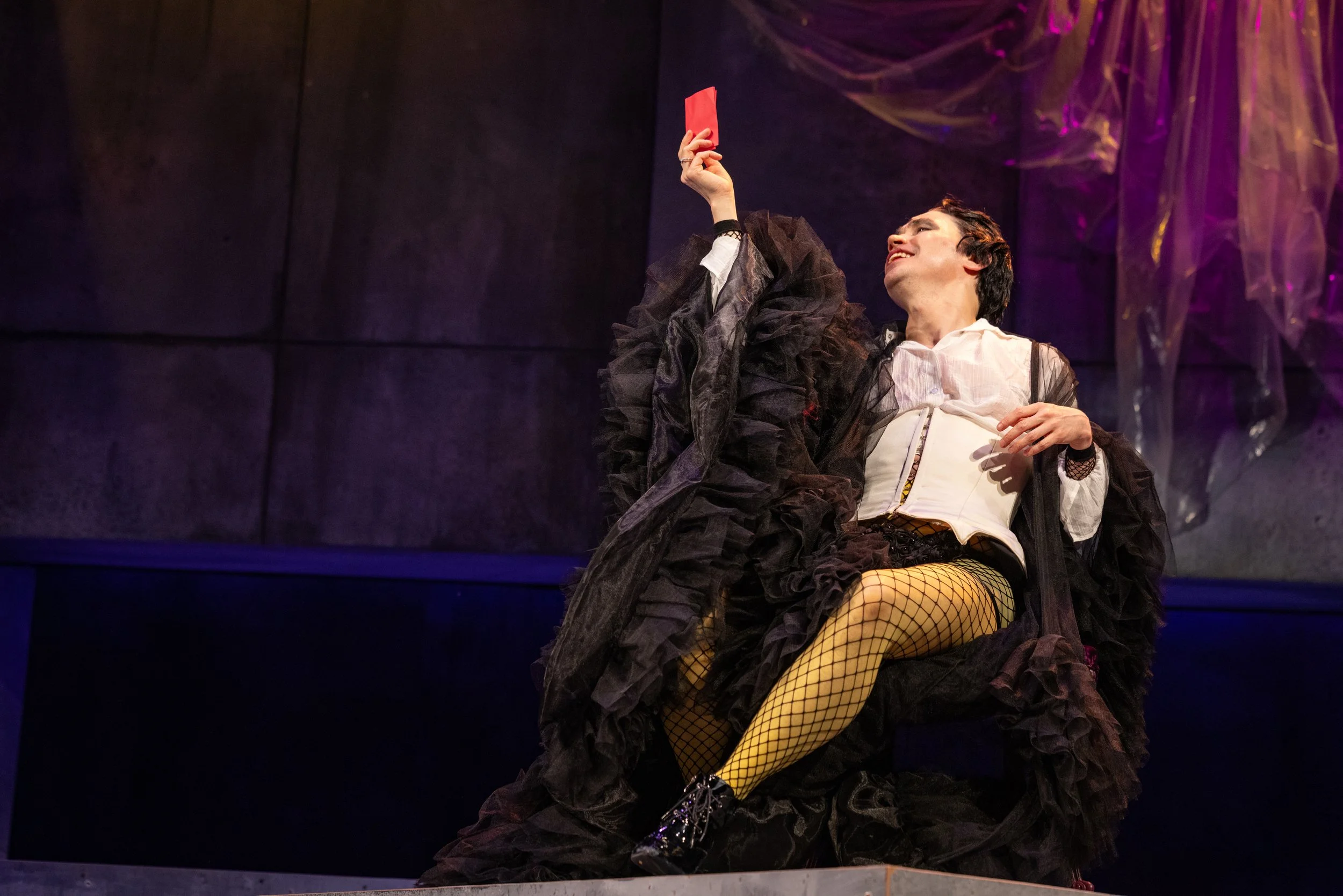Review: The Bard Gets Bawdy—and Queer—for World Pride in Folger’s ‘Twelfth Night’
Mei Ann Teo seizes the opportunity to expand on the play’s hallmark subversion of gender and sexuality through a maximalist approach.
By D.R. Lewis
May 23, 2025
This review originally appeared in Washington City Paper.
When one thinks of William Shakespeare and fruit, perhaps the first thing that comes to mind is the pomegranate tree from which the nightingale sings to Juliet, a wishful mistake for the morning lark that brings an end to the young heterosexuals’ first brush with forbidden love.
That might not be the case for much longer, though, at least not for Folger Theatre audiences who take in director Mei Ann Teo’s bawdy new production of Twelfth Night, which plays through June 22 and touts an unusually large bag from Bite the Fruit, the longtime Dupont Circle purveyor of “provocative apparel and adult novelty.” But unlike that other play, there isn’t much that’s forbidden (or particularly hetero, come to think of it) in Teo’s lively staging.
And why should there be? With WorldPride taking over D.C., it’s hard to imagine a better selection for the Folger than Twelfth Night, Shakespeare’s beloved romp of unabashed sexuality, meandering romantic entanglements, and playful exploration of gender expression. In Ilyria, twins Sebastian (El Beh, delightful) and Viola (Lilli Hokama, soulful) are separated in a shipwreck. Disguised as a young man, Viola becomes an aide to the noble Orsino (Alyssa Keegan, excitingly broody), who sends her (again, in disguise) to woo the wealthy countess Olivia (Alina Collins Maldonado) on his behalf. Olivia—who is also being courted by the scoundrel steward Malvolio (Nicholas Yenson, whose fantastic interpretation is somewhere between Marlene Dietrich and Squidward)—in turn falls for Viola (did I mention she’s in disguise?), who is herself developing an attraction to Orsino. On the periphery, some randy nobles (Hunter Ringsmith and Che Kabia) and court jester Feste (Futaba) revel in bringing humiliation onto Malvolio, and when Sebastian finally appears to the surprise and confusion of all, further chaos predictably ensues.
Teo rightfully sees the tremendous opportunity in staging this play now and creatively expands on Twelfth Night’s hallmark subversion of gender and sexuality through a maximalist approach (wait until you see the codpieces, with terrific costume design by Olivera Gajic). Teo’s Twelfth Night is a little kinky (Malvolio’s traditional cross-garters are traded for fishnets), a lot sexy (Sir Andrew shows some serious skin), and majorly raucous (is that riding crop a member of Equity?). Under Teo’s direction, more is more is more. “The guiding question in the rehearsal room,” Teo writes in the program note: “What would RuPaul do?”
The challenge with the production, however, is cohesion rather than concept. Brought to life onstage, it’s a bit unwieldy; not so much a production bursting out of the theater, but rather one claustrophobically constrained within the space. Live-capture projections (designed by Hao Bai) to magnify and multiply the human action onstage? Check. A hulking, brutalist set (by scenic designer David I. Reynoso) to cover the standard wooden facade of the Elizabethan Theatre, including two bulky columns that are a perennial obstacle for directors? Done. Original incidental music (from composer Be Steadwell) blended with recognizable Adele and Madonna riffs? Got it.
But perhaps too much of a good thing is still “too much.” Even beyond the slapstick comedy—Malvolio walking into a wall, or a courtier rolling themselves off the stage, or the recurring appearance of two floppy phallic toys—the promise of such technical pomp doesn’t really pay off. The projections, while skillful, often wash out and appear almost entirely in service to one scene near the end of the play, and even then without much of a compelling reason. The set itself—a gray concrete underground sheathed in plastic—seems almost sheepishly plain behind the vibrant costumes and exuberant performances (characters sometimes hold mics and sing directly to the audience or one another, with sound design by Justin Schmitz). And though “music be the food of love,” Steadwell’s tunes are most effective when ambient, underscoring the characters’ confusions and emotional maneuvers.
This critic understands the danger of keeping Shakespeare frozen in amber. To do so would not only be a disservice to creatives like Teo who rightfully see these plays as ripe for reimagination, but also diminishing of the writer’s unique gift for identifying the universal truths in each of us—which include those human desires to be a little naughty and subversive. But festooning the play so wholly that the text begins to disappear behind it all—not only in production and performance, but through script embellishments like “mother-Falstaff” as a substitute for a different expletive—quickly runs the risk of seeing diminishing returns. This Twelfth Night doesn’t quite cross that line, but it comes close.
Regardless of all its big swings—successful and not—this Twelfth Night admirably preserves and promotes the bent toward joyfulness even in the midst of tragedy that lies at the play’s heart. Longtime lovers of the work will delight in revisiting one of Shakespeare’s best, especially as the rising roar of Pride pulsates with a renewing undercurrent of protest. And newcomers to the piece will benefit from an introduction that is imbued with Teo’s fundamental attitude toward it: “The action of the play is to PLAY.” You Bard-er work.
William Shakespeare’s Twelfth Night, directed by Mei Ann Tao, runs through June 22 at Folger Theatre. folger.edu. $20–$84.
Nicholas Yenson as Malvolio. Photo by Erika Nizborski
